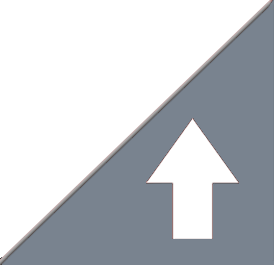Blog
24 Nov 2018
Do you have jaw pain?
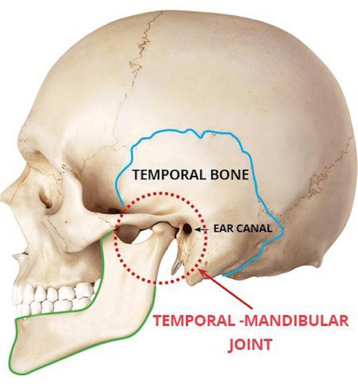
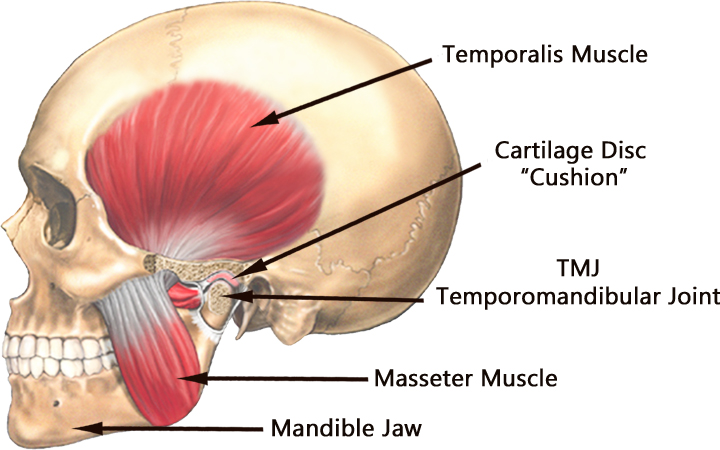
Does running your dog in the agility ring make you clench your teeth with anticipation? Does your dog have an injury that is causing you stress and hence you’ve been grinding your teeth at night? These scenarios may be one of many things that cause you to grind, clench or tighten your jaw muscles. Other common factors may be recent dental work on your teeth, a facial injury or even a neck injury.
If you’ve had jaw pain before, you likely know what the TMJ is. The TMJ is the temporomandibular joint, commonly known as your jaw. This joint is made up of your mandible, the lower jaw bone, and the temporal bone of the skull. There are two joints, one on each side your head, that articulate together. The TMJ opens, closes, deviates side to side and forward and back. There is an intra-articular disc within each joint, a capsule, surrounding ligaments, muscles, and a rich nerve supply.
The TMJ can be affected by dental work, dental appliances, whiplash injuries, chronic teeth grinding, excessive chewing, or postural dysfunctions. Some symptoms of TMJ dysfunctions are clicking in the jaw, grinding sounds, pain with chewing or talking, and pain with yawning or swallowing. In some cases, symptoms may include locking of the jaw, either open or closed, headaches, vertigo, ringing in the ears, facial pain, numbness along the jaw or temples, and neck pain. TMJ symptoms are often associated with ear and throat symptoms. This is likely due to the fact that these structures evolved together and still retain some common motor and sensory relationships.
The joint surface of the TMJ may also be affected by developmental anomalies, trauma, osteo-arthritis and rheumatoid arthritis. These changes may cause either laxity in the joint (too much movement), excessive pressure in the joint (muscle tension / clenching), adhesions of the disc to the joint, a damaged disc, or damaged ligaments.
Physiotherapists are specialized in examining the joint biomechanics o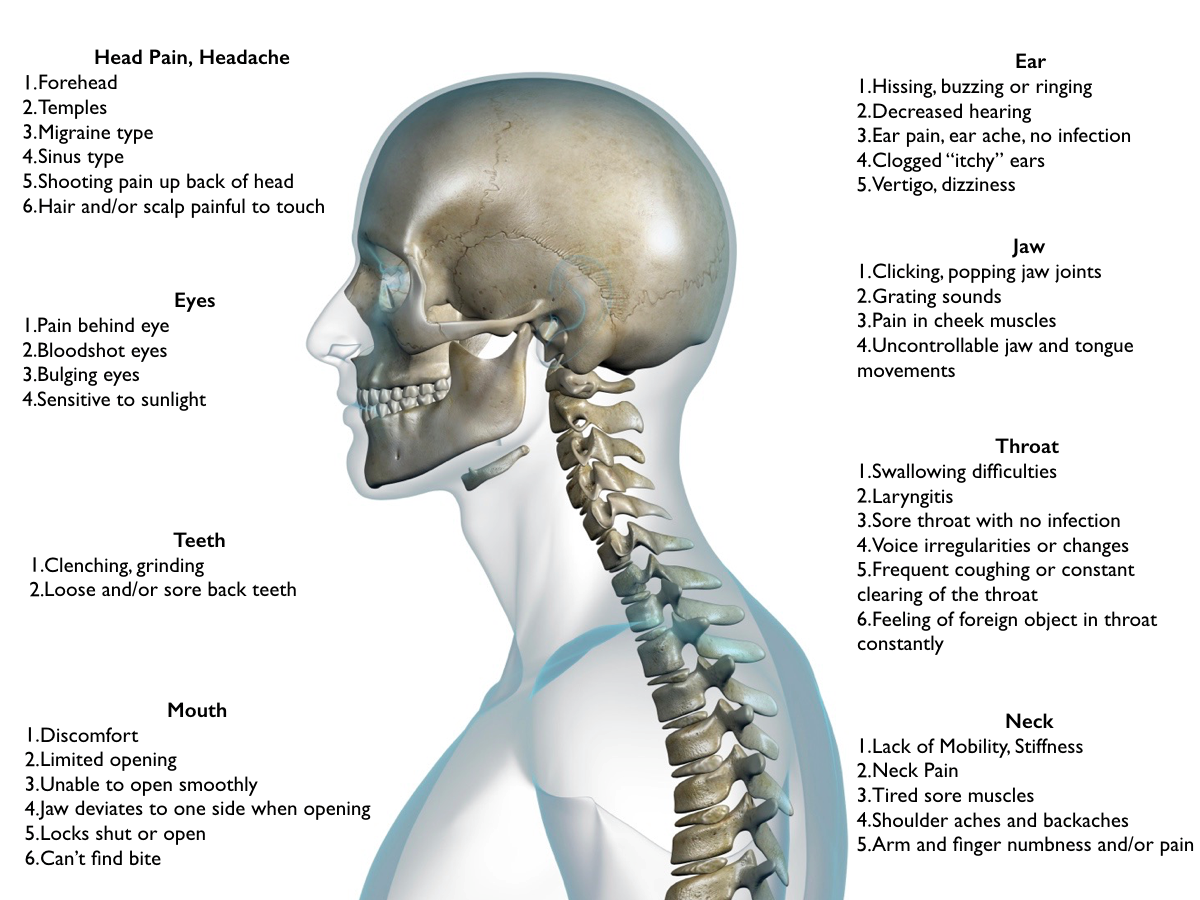 f the TMJ. We evaluate the muscle movements, the ligament integrity and manually palpate the surrounding structures. We obtain a subjective history of past injuries, symptoms of pain, and dental history. We assess general posture, the mobility of the neck, mobility of the TMJ and may perform an internal exam to feel the joint movement, ligaments and muscles of the jaw. We often say in physiotherapy that the TMJ issues are only 50% related to the teeth and the temporomandibular joint itself and the other 50% is related to the neck. This is an aspect that most dentists fail to recognize and why it is very important to work with both disciplines if you have symptoms related to TMJ. It becomes even more important if your dentist has placed a splint in your mouth for grinding or clenching issues. This will often affect other structures most commonly in the neck which then have to be treated in order for that splint therapy to be effective. Another type of splint that we are seeing more recently are those used as anti-snore devices. Because these splints move your lower jaw bone forward they can affect the TMJ joint, the joints of the neck as well as all the muscles in the jaw and neck region. Again the best results are usually obtained from accessing treatment from a physiotherapist as well as the dentist.
f the TMJ. We evaluate the muscle movements, the ligament integrity and manually palpate the surrounding structures. We obtain a subjective history of past injuries, symptoms of pain, and dental history. We assess general posture, the mobility of the neck, mobility of the TMJ and may perform an internal exam to feel the joint movement, ligaments and muscles of the jaw. We often say in physiotherapy that the TMJ issues are only 50% related to the teeth and the temporomandibular joint itself and the other 50% is related to the neck. This is an aspect that most dentists fail to recognize and why it is very important to work with both disciplines if you have symptoms related to TMJ. It becomes even more important if your dentist has placed a splint in your mouth for grinding or clenching issues. This will often affect other structures most commonly in the neck which then have to be treated in order for that splint therapy to be effective. Another type of splint that we are seeing more recently are those used as anti-snore devices. Because these splints move your lower jaw bone forward they can affect the TMJ joint, the joints of the neck as well as all the muscles in the jaw and neck region. Again the best results are usually obtained from accessing treatment from a physiotherapist as well as the dentist.
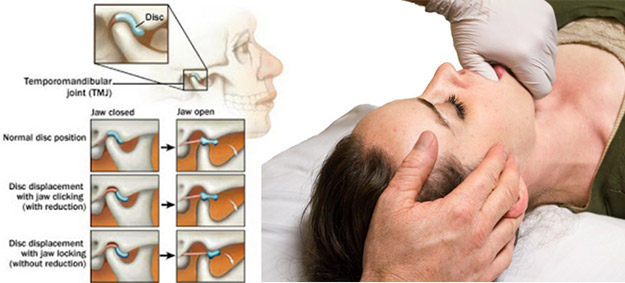
Treatment of this area may include postural education, manual therapy to mobilize the joint, trigger point release of surrounding muscles, muscle re-education of jaw mechanics and tongue position. Education may include sleeping positions, resting jaw position, eating and yawning modifications. We may teach you range of motion exercises, isometric jaw strengthening exercises, and neck strengthening exercises. Modalities such as ultrasound, laser, TENS, and acupuncture may be helpful to control pain and promote circulation to the area. In extreme cases, one may require splinting and a referral to the dentist for further evaluation.
If you experience any of these issues, we at Two Hands Physio would love to help you. Please call the clinic to book in with one of our physiotherapists and sort out your jaw pain!
Jennifer Gordon (BScPT, CAFCI, BA Kin)
Physiotherapist, Two Hands Physiotherapy
